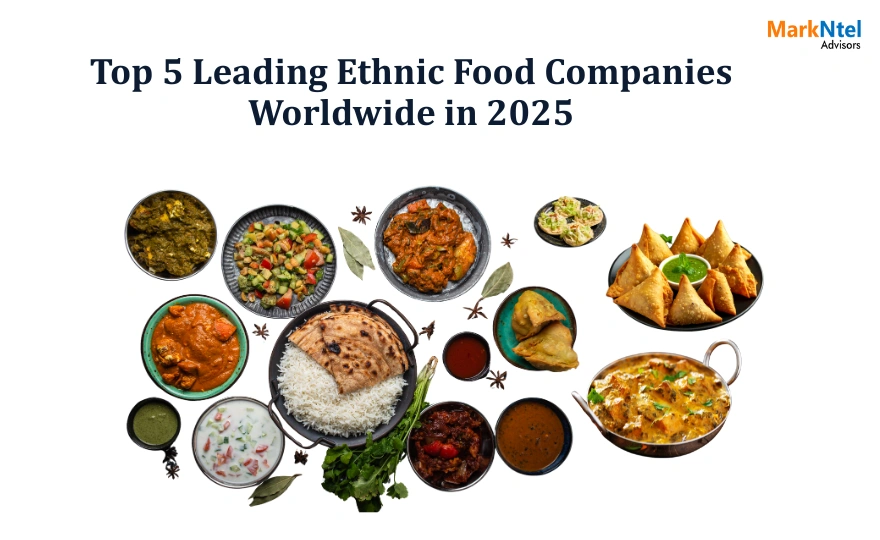The consumption and demand for ethnic food are rising sharply, driven by increasing globalization, cultural curiosity, and growing appreciation for authentic culinary experiences. As consumers seek diverse flavors and traditional recipes, ethnic food brands are witnessing expanding market opportunities. Key companies are sustaining this growing demand by continuously innovating their product portfolios, scaling operations, and embracing digital marketing to attract and retain consumers globally. According to Markntel Advisors, these companies are now reshaping the global ethnic food market through strategic expansion, sustainable sourcing, and by leveraging technology to streamline production and distribution, enhancing customer engagement worldwide.
The Global Ethnic Food Market size was valued at around USD 78.2 billion in 2024 and is estimated to grow at a CAGR of around 7.50% during the forecast period, i.e., 2025-30, demonstrating a strong growth trajectory due to the key initiatives by the leading ethnic food company.
This blog aims to provide a comprehensive overview of the top 10 ethnic food companies globally, showcasing their strategic initiatives, the role of AI in driving operational efficiencies, and insights into the dynamic future of the ethnic food industry. By highlighting these factors, the blog offers valuable perspectives on how ethnic food companies are merging tradition with innovation to capture expanding global demand.

Ajinomoto leverages innovation and market diversification as cornerstones of its strategy. In 2024, it launched a plant-based snack and Halal-certified frozen gyoza via Ajinomoto (Malaysia) Berhad during MAHA Go Global 2024, targeting B2B and food service sectors across Malaysia. This move highlights Ajinomoto’s commitment to expanding its ethnic food portfolio to capture growing consumer demand for health-conscious, halal, and convenience foods, particularly in emerging Southeast Asian markets. The company also invests in sustainable sourcing and advanced food technologies to reinforce its global market leadership.
Nestlé employs a diversified product portfolio strategy focused on innovation within ethnic cuisine while adapting to local tastes and preferences globally. Nestlé prioritizes nutrition, sustainability, and digital transformation initiatives, emphasizing clean-label ingredients and plant-based alternatives. Their strategic investments in R&D, consumer insights, and supply chain optimization strengthen Nestlé’s position as a leader in the evolving global ethnic food segment, targeting health-conscious and ethically aware consumers worldwide.
McCormick capitalizes on flavor innovation and strategic marketing tailored to ethnic food consumers. The company focuses on developing authentic spices, seasonings, and sauces that cater to diverse cultural tastes. By leveraging data analytics and digital engagement, McCormick enhances consumer connection and product personalization while expanding its footprint in key ethnic food markets. Sustainability in sourcing and product transparency remain integral to McCormick’s growth strategy, ensuring alignment with modern consumer values.
Conagra adopts a product innovation and scalability approach in ethnic foods, emphasizing ready-to-eat and frozen meal solutions that integrate traditional flavors. The company invests in expanding manufacturing capabilities and distribution networks to meet increasing ethnic food demand globally. Conagra’s strategy also encompasses brand revitalization and consumer-centric marketing, focusing on convenience, authenticity, and health trends to appeal to both multicultural and mainstream markets.
Unilever’s strategy centers on sustainable sourcing, brand building, and innovation in ethnic food categories. The company emphasizes plant-based products and clean-label formulations, responding to growing demands for mindful eating and environmental responsibility. Unilever leverages its global footprint and digital platforms to promote ethnic cuisines while fostering community engagement and partnerships that support smallholder farmers, driving both social impact and long-term industry growth.
Download a free sample of Ethnic Food Market report for a comprehensive overview of industry dynamics, competitive landscape, key strategic initiatives, recent developments of key players, detailed segmentation, and regional forecasts shaping the market outlook.
The future of the ethnic food industry is poised for transformational growth by surpassing USD 120.69 billion by 2030, owing to players' strategic adoption of AI technologies. Leading companies are leveraging AI to optimize supply chains, enhance product innovation, and tailor consumer experiences, resulting in improved efficiency and market responsiveness. Recent launches, such as Ajinomoto's plant-based and halal-certified products, exemplify the fusion of innovation and cultural authenticity enabled by AI insights. As global demand for ethnic foods grows, AI’s role in predictive analytics, sustainable sourcing, and personalized marketing will intensify, positioning these companies to reshape the industry landscape with agility and consumer-centric strategies, ensuring sustained growth and competitive advantage.
Get in touch with us today to request a regional report that fits your needs - sales@marknteladvisors.com